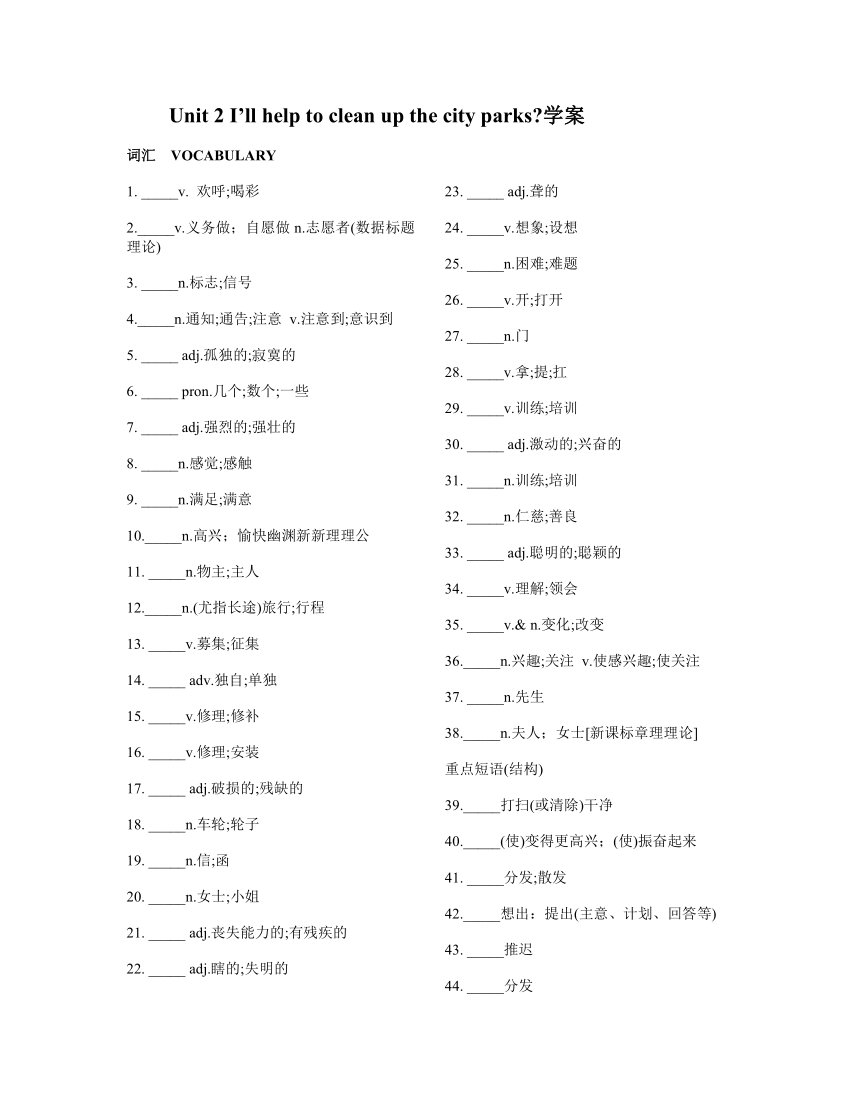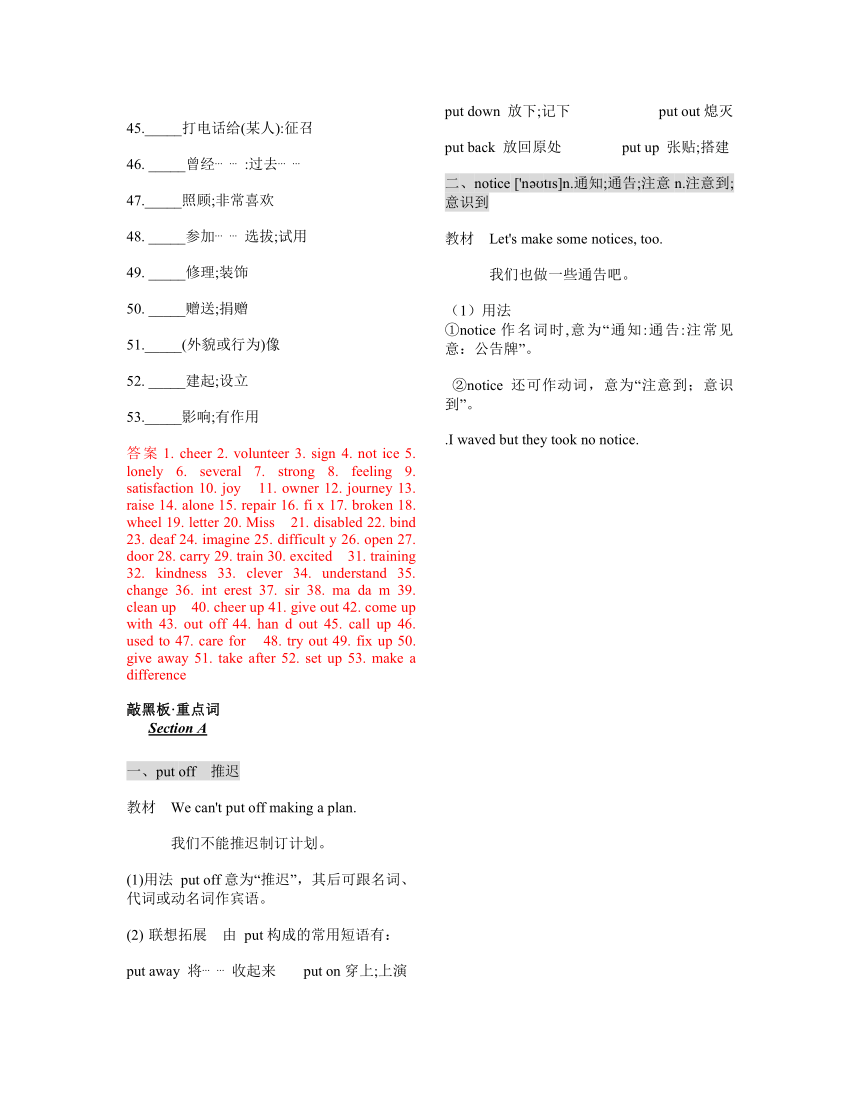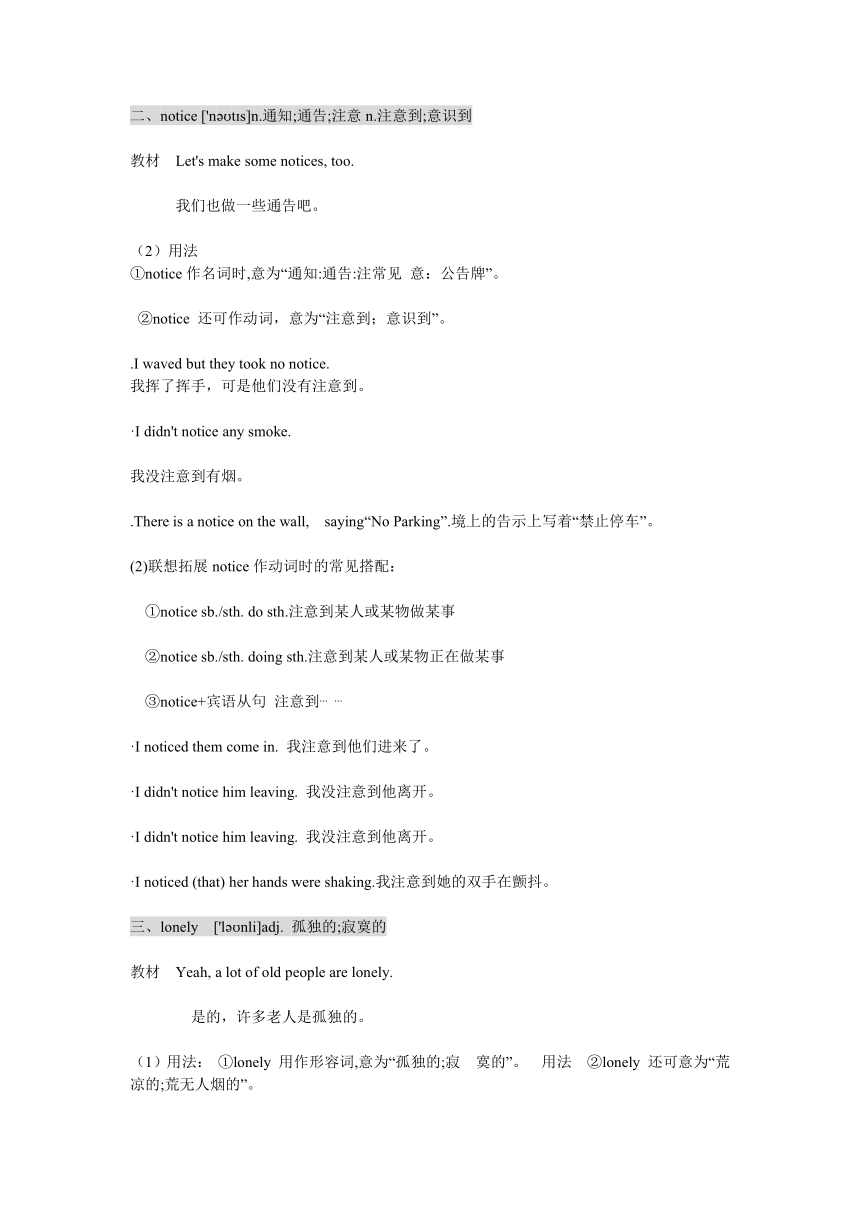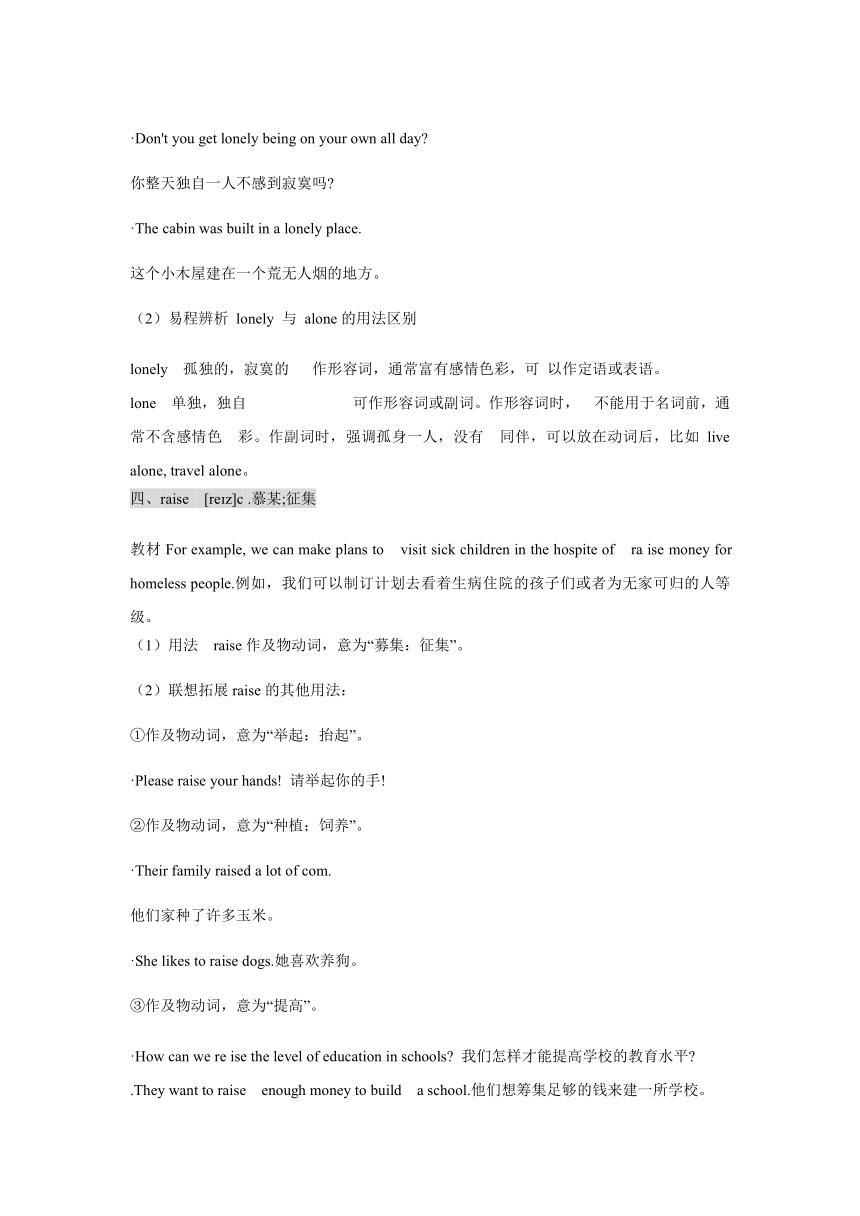Unit 2 I'll help to clean up the city parks.重点讲解 +动词不定式 it作形式主语
文档属性
| 名称 | Unit 2 I'll help to clean up the city parks.重点讲解 +动词不定式 it作形式主语 |  | |
| 格式 | docx | ||
| 文件大小 | 24.7KB | ||
| 资源类型 | 教案 | ||
| 版本资源 | 人教新目标(Go for it)版 | ||
| 科目 | 英语 | ||
| 更新时间 | 2024-06-08 10:04:02 | ||
图片预览




文档简介
Unit 2 I’ll help to clean up the city parks 学案
词汇 VOCABULARY
1. _____v. 欢呼;喝彩
2._____v.义务做;自愿做n.志愿者(数据标题理论)
3. _____n.标志;信号
4._____n.通知;通告;注意 v.注意到;意识到
5. _____ adj.孤独的;寂寞的
6. _____ pron.几个;数个;一些
7. _____ adj.强烈的;强壮的
8. _____n.感觉;感触
9. _____n.满足;满意
10._____n.高兴;愉快幽渊新新理理公
11. _____n.物主;主人
12._____n.(尤指长途)旅行;行程
13. _____v.募集;征集
14. _____ adv.独自;单独
15. _____v.修理;修补
16. _____v.修理;安装
17. _____ adj.破损的;残缺的
18. _____n.车轮;轮子
19. _____n.信;函
20. _____n.女士;小姐
21. _____ adj.丧失能力的;有残疾的
22. _____ adj.瞎的;失明的
23. _____ adj.聋的
24. _____v.想象;设想
25. _____n.困难;难题
26. _____v.开;打开
27. _____n.门
28. _____v.拿;提;扛
29. _____v.训练;培训
30. _____ adj.激动的;兴奋的
31. _____n.训练;培训
32. _____n.仁慈;善良
33. _____ adj.聪明的;聪颖的
34. _____v.理解;领会
35. _____v.& n.变化;改变
36._____n.兴趣;关注 v.使感兴趣;使关注
37. _____n.先生
38._____n.夫人;女士[新课标章理理论]
重点短语(结构)
39._____打扫(或清除)干净
40._____(使)变得更高兴;(使)振奋起来
41. _____分发;散发
42._____想出:提出(主意、计划、回答等)
43. _____推迟
44. _____分发
45._____打电话给(某人):征召
46. _____曾经 :过去
47._____照顾;非常喜欢
48. _____参加 选拔;试用
49. _____修理;装饰
50. _____赠送;捐赠
51._____(外貌或行为)像
52. _____建起;设立
53._____影响;有作用
答案1. cheer 2. volunteer 3. sign 4. not ice 5. lonely 6. several 7. strong 8. feeling 9. satisfaction 10. joy 11. owner 12. journey 13. raise 14. alone 15. repair 16. fi x 17. broken 18. wheel 19. letter 20. Miss 21. disabled 22. bind 23. deaf 24. imagine 25. difficult y 26. open 27. door 28. carry 29. train 30. excited 31. training 32. kindness 33. clever 34. understand 35. change 36. int erest 37. sir 38. ma da m 39. clean up 40. cheer up 41. give out 42. come up with 43. out off 44. han d out 45. call up 46. used to 47. care for 48. try out 49. fix up 50. give away 51. take after 52. set up 53. make a difference
敲黑板·重点词
Section A
一、put off 推迟
教材 We can't put off making a plan.
我们不能推迟制订计划。
(1)用法 put off意为“推迟”,其后可跟名词、代词或动名词作宾语。
联想拓展 由 put构成的常用短语有:
put away 将 收起来 put on穿上;上演
put down 放下;记下 put out熄灭
put back 放回原处 put up 张贴;搭建
二、notice ['n t s]n.通知;通告;注意n.注意到;意识到
教材 Let's make some notices, too.
我们也做一些通告吧。
用法
①notice作名词时,意为“通知:通告:注常见 意:公告牌”。
②notice 还可作动词,意为“注意到;意识到”。
.I waved but they took no notice.
二、notice ['n t s]n.通知;通告;注意n.注意到;意识到
教材 Let's make some notices, too.
我们也做一些通告吧。
用法
①notice作名词时,意为“通知:通告:注常见 意:公告牌”。
②notice 还可作动词,意为“注意到;意识到”。
.I waved but they took no notice.
我挥了挥手,可是他们没有注意到。
·I didn't notice any smoke.
我没注意到有烟。
.There is a notice on the wall, saying“No Parking”.境上的告示上写着“禁止停车”。
(2)联想拓展notice作动词时的常见搭配:
①notice sb./sth. do sth.注意到某人或某物做某事
②notice sb./sth. doing sth.注意到某人或某物正在做某事
③notice+宾语从句 注意到
·I noticed them come in. 我注意到他们进来了。
·I didn't notice him leaving. 我没注意到他离开。
·I didn't notice him leaving. 我没注意到他离开。
·I noticed (that) her hands were shaking.我注意到她的双手在颤抖。
三、lonely ['l nli]adj. 孤独的;寂寞的
教材 Yeah, a lot of old people are lonely.
是的,许多老人是孤独的。
(1)用法: ①lonely 用作形容词,意为“孤独的;寂 寞的”。 用法 ②lonely 还可意为“荒凉的;荒无人烟的”。
·Don't you get lonely being on your own all day
你整天独自一人不感到寂寞吗
·The cabin was built in a lonely place.
这个小木屋建在一个荒无人烟的地方。
(2)易程辨析 lonely 与 alone的用法区别
lonely 孤独的,寂寞的 作形容词,通常富有感彩,可 以作定语或表语。
lone 单独,独自 可作形容词或副词。作形容词时, 不能用于名词前,通常不含感 彩。作副词时,强调孤身一人,没有 同伴,可以放在动词后,比如 live alone, travel alone。
四、raise [re z]c .慕某;征集
教材For example, we can make plans to visit sick children in the hospite of ra ise money for homeless people.例如,我们可以制订计划去看着生病住院的孩子们或者为无家可归的人等级。
(1)用法 raise作及物动词,意为“募集:征集”。
(2)联想拓展raise的其他用法:
①作及物动词,意为“举起:抬起”。
·Please raise your hands! 请举起你的手!
②作及物动词,意为“种植;饲养”。
·Their family raised a lot of com.
他们家种了许多玉米。
·She likes to raise dogs.她喜欢养狗。
③作及物动词,意为“提高”。
·How can we re ise the level of education in schools 我们怎样才能提高学校的教育水平
.They want to raise enough money to build a school.他们想筹集足够的钱来建一所学校。
Section B
一、difficulty ['d f k lti]。困难;难题
数材 Most people would never think about this, but many people have these difficulties.
大部分人永远不会考虑这一点,但是很多人有这些难题。
用法:
difficulty 在此处作可数名词,意为“难题”。
当difficulty 表示抽象的困难时,为不可数名词,常用于短语 have difficulty(in) doing sth.,意为“做
某事有困难”。当difficult y表示具体的难事时,为可数名词。
·We are confident that we can overcome these difficulties. 我们有信心我们能克服这些困难。
·He had great difficult y in finding a good job.他找份好工作很困难。
联想拓展
difficulty的形容词形式为 difficult。部分形容词加y可以变为名词,比如 honest的名词形
式为 honesty。
二、change [t e nd ] v.变化;改变
教材 Thank you again for changing my life.
再一次感谢您改变了我的生活。
用法:change 作动词,意为“变化;改变”,常用搭配 change one's life意为“改变某人的生活”。
change 作名词,意为“变化:改变”,可以用small, big, great等词来修饰,常见搭配有
常见搭配有 make a change to sth.,意为“对某物/事作出改变”。
.Computers have changed the way people work.计算机改变了人们的工作方式。
·A small change in design can make a big change to your sleep. 设计上的一个小改变能大大改善你的睡眠。
联想拓展
change 表示“零钱”时,为不可数名词。
三、interest ('mtr st)、兴趣;关注。使感兴趣;使关注
教材 What are your interests and hobbies 你的兴趣和爱好是什么
用法:interest在此处作名词,意为“兴趣;关注”,可以用于短语have/show/take an interest in
(doing) sth.。其作动词时意为“使感兴趣;使关注”。
·I read your article with great interest.
我兴致勃勃地读了您的文章。
·Ben has shown an interest in learning French.本表现出了学习法语的兴趣。
联想拓展
interest的形容词形式为 interested 和interesting。
interested 意为“感兴趣的”,常用来修饰人,常用于 be interested in (doing) sth.结构中
interesting 意为“有趣的;吸引人的”,常用来修的物。
·I'm interested in music.我对音乐感兴趣。
·That's an interesting question. 那是一个有趣的问题。
四、carry ['k ri]v.拿;提;扛
教材…so normal things like answering the telephone, opening and closing doors, or carrying things
are difficult for me.······因此像接电话、开关门或者提东西之类的普通的事情对我来说很困难。
常见 carry 用作及物动词,意为“章:提:扛”。
(1)用法: 还可意为“携带;佩带”。
·She carried her baby in her arms.
她怀里抱着她的宝宝。
·Police in many countries car ry guns.
许多国家的警察都带枪。
句式 SENTENCES it作形式宾语
教材You helped to make it possible for me to have Lucky. 有了你的帮助,我才有可能拥有“幸运儿”(狗名)。
(1)“make it+adj.(+for sb.)+to do sth.”
表示“使(某人)做某事……”。make 的真正宾语是后面的动词不定式,it作其形式宾语。
动词find 也有此用法,“sb. finds it*adj.+to do sth."表示"某人觉得做某事是 的”。
.His wounded leg made _____ difficult for him to walk.
A. this B. that C. it D. one
【解析】句意为:他那条受伤的随便他走路很困难。分析句子结构可以知道to walk 是 made 真正的宾语,此空需要填一个形式宾语,因此填it。
【答案】C
语法 GRALIMAR
动词不定式
教材The girl could visit the sick kids in the hospital to cheer them up. 这个女孩可以看望医院里生病的孩子们。使他们高兴起来。
动词不定式是动词的一种非谓语形式,它没有人称和数的变化,基本形式为“to+动词原形(有时可以不带to)”,在句子中不能作谓语。动词不定式有以下几种用法:
动词不定式作主语。
动词不定式作主语时,一般位于句首。单个不定式短语作主语时,谓语动词用第三人称单数形式。如果动词不定式太长,则可用it作形式主语,构成“It…to do sth.”句型。
位于句首,单个不定式短语作主语时,请语动词用第三人称单数形式。
. To learn a form eringome is important for it=It’s important for us to lear n a foreignlanguage.学习一门外话对我们来说很重要。
动词不定式作宾语。
后面动词不定式作宾语的动词(短语)有 want, hope, begin, Br.decide, expect, refuse, would like等。
·Tom re fused to go into the hospita l again.
汤姆拒绝再进医院。
动词不定式作宾语补足语。
动词不定式作宾语补足语的动词有ask, tell, want, except等。
·Ho asked me to take about my English study.如果求我说谈有关我英语学习的事。
4.动词不定式作状语,动词不定式作状语时,一般位于句首或者句末,表示目的、原因、结果等。
·To get good grades, I will study hard.=I will study hard to get good grades.
为了取得好成蛙,我将会努力学习。
5.动词不定式作定语。
动词不定式作定语时,常位于所修饰的名词代词之后。
·She got a job to tea ch children .
她找到了一份教教子纸工作。
6.疑问词+动词不定式
·I don't know what to do. 我不知道做什么。
7.省略动词不定式中to的情况。
①使役动词let, make, have之后。
②知觉动词(短语) feel, her, see, wear.notice, listen to 之后。
②动词 help 后可省略。
·Lot me there. 让我感恩。
·I saw my mother get out.我看到我妈妈出去了。
·He helped her (to ) any the case up to stars. 他帮她把鞋子脸上了餐。
8.动词不定式的否定形式由“not+语词不定式”构成。
·Tell her not to be late. 告诉她不要迟到。
口诀巧记忆 ①巧记省略动词不定式符号to作宾语补足语的词:
“一感”(feel):“二听”(listen to, hear):
“三让”(let, make, have)
“四看”(look at, see, watch,notice)
“半帮助”(即在动词help 的面作宾语补足证时,to可有可无)。
②巧记后接动词不定式的词:
三个希望两答应 hope, Wish, want, agree, promote
两个要求莫拒绝demand, ask, refuse
设法学会做决定 manage,learn,decide
不要假装在选择pretend, choose
词汇 VOCABULARY
1. _____v. 欢呼;喝彩
2._____v.义务做;自愿做n.志愿者(数据标题理论)
3. _____n.标志;信号
4._____n.通知;通告;注意 v.注意到;意识到
5. _____ adj.孤独的;寂寞的
6. _____ pron.几个;数个;一些
7. _____ adj.强烈的;强壮的
8. _____n.感觉;感触
9. _____n.满足;满意
10._____n.高兴;愉快幽渊新新理理公
11. _____n.物主;主人
12._____n.(尤指长途)旅行;行程
13. _____v.募集;征集
14. _____ adv.独自;单独
15. _____v.修理;修补
16. _____v.修理;安装
17. _____ adj.破损的;残缺的
18. _____n.车轮;轮子
19. _____n.信;函
20. _____n.女士;小姐
21. _____ adj.丧失能力的;有残疾的
22. _____ adj.瞎的;失明的
23. _____ adj.聋的
24. _____v.想象;设想
25. _____n.困难;难题
26. _____v.开;打开
27. _____n.门
28. _____v.拿;提;扛
29. _____v.训练;培训
30. _____ adj.激动的;兴奋的
31. _____n.训练;培训
32. _____n.仁慈;善良
33. _____ adj.聪明的;聪颖的
34. _____v.理解;领会
35. _____v.& n.变化;改变
36._____n.兴趣;关注 v.使感兴趣;使关注
37. _____n.先生
38._____n.夫人;女士[新课标章理理论]
重点短语(结构)
39._____打扫(或清除)干净
40._____(使)变得更高兴;(使)振奋起来
41. _____分发;散发
42._____想出:提出(主意、计划、回答等)
43. _____推迟
44. _____分发
45._____打电话给(某人):征召
46. _____曾经 :过去
47._____照顾;非常喜欢
48. _____参加 选拔;试用
49. _____修理;装饰
50. _____赠送;捐赠
51._____(外貌或行为)像
52. _____建起;设立
53._____影响;有作用
答案1. cheer 2. volunteer 3. sign 4. not ice 5. lonely 6. several 7. strong 8. feeling 9. satisfaction 10. joy 11. owner 12. journey 13. raise 14. alone 15. repair 16. fi x 17. broken 18. wheel 19. letter 20. Miss 21. disabled 22. bind 23. deaf 24. imagine 25. difficult y 26. open 27. door 28. carry 29. train 30. excited 31. training 32. kindness 33. clever 34. understand 35. change 36. int erest 37. sir 38. ma da m 39. clean up 40. cheer up 41. give out 42. come up with 43. out off 44. han d out 45. call up 46. used to 47. care for 48. try out 49. fix up 50. give away 51. take after 52. set up 53. make a difference
敲黑板·重点词
Section A
一、put off 推迟
教材 We can't put off making a plan.
我们不能推迟制订计划。
(1)用法 put off意为“推迟”,其后可跟名词、代词或动名词作宾语。
联想拓展 由 put构成的常用短语有:
put away 将 收起来 put on穿上;上演
put down 放下;记下 put out熄灭
put back 放回原处 put up 张贴;搭建
二、notice ['n t s]n.通知;通告;注意n.注意到;意识到
教材 Let's make some notices, too.
我们也做一些通告吧。
用法
①notice作名词时,意为“通知:通告:注常见 意:公告牌”。
②notice 还可作动词,意为“注意到;意识到”。
.I waved but they took no notice.
二、notice ['n t s]n.通知;通告;注意n.注意到;意识到
教材 Let's make some notices, too.
我们也做一些通告吧。
用法
①notice作名词时,意为“通知:通告:注常见 意:公告牌”。
②notice 还可作动词,意为“注意到;意识到”。
.I waved but they took no notice.
我挥了挥手,可是他们没有注意到。
·I didn't notice any smoke.
我没注意到有烟。
.There is a notice on the wall, saying“No Parking”.境上的告示上写着“禁止停车”。
(2)联想拓展notice作动词时的常见搭配:
①notice sb./sth. do sth.注意到某人或某物做某事
②notice sb./sth. doing sth.注意到某人或某物正在做某事
③notice+宾语从句 注意到
·I noticed them come in. 我注意到他们进来了。
·I didn't notice him leaving. 我没注意到他离开。
·I didn't notice him leaving. 我没注意到他离开。
·I noticed (that) her hands were shaking.我注意到她的双手在颤抖。
三、lonely ['l nli]adj. 孤独的;寂寞的
教材 Yeah, a lot of old people are lonely.
是的,许多老人是孤独的。
(1)用法: ①lonely 用作形容词,意为“孤独的;寂 寞的”。 用法 ②lonely 还可意为“荒凉的;荒无人烟的”。
·Don't you get lonely being on your own all day
你整天独自一人不感到寂寞吗
·The cabin was built in a lonely place.
这个小木屋建在一个荒无人烟的地方。
(2)易程辨析 lonely 与 alone的用法区别
lonely 孤独的,寂寞的 作形容词,通常富有感彩,可 以作定语或表语。
lone 单独,独自 可作形容词或副词。作形容词时, 不能用于名词前,通常不含感 彩。作副词时,强调孤身一人,没有 同伴,可以放在动词后,比如 live alone, travel alone。
四、raise [re z]c .慕某;征集
教材For example, we can make plans to visit sick children in the hospite of ra ise money for homeless people.例如,我们可以制订计划去看着生病住院的孩子们或者为无家可归的人等级。
(1)用法 raise作及物动词,意为“募集:征集”。
(2)联想拓展raise的其他用法:
①作及物动词,意为“举起:抬起”。
·Please raise your hands! 请举起你的手!
②作及物动词,意为“种植;饲养”。
·Their family raised a lot of com.
他们家种了许多玉米。
·She likes to raise dogs.她喜欢养狗。
③作及物动词,意为“提高”。
·How can we re ise the level of education in schools 我们怎样才能提高学校的教育水平
.They want to raise enough money to build a school.他们想筹集足够的钱来建一所学校。
Section B
一、difficulty ['d f k lti]。困难;难题
数材 Most people would never think about this, but many people have these difficulties.
大部分人永远不会考虑这一点,但是很多人有这些难题。
用法:
difficulty 在此处作可数名词,意为“难题”。
当difficulty 表示抽象的困难时,为不可数名词,常用于短语 have difficulty(in) doing sth.,意为“做
某事有困难”。当difficult y表示具体的难事时,为可数名词。
·We are confident that we can overcome these difficulties. 我们有信心我们能克服这些困难。
·He had great difficult y in finding a good job.他找份好工作很困难。
联想拓展
difficulty的形容词形式为 difficult。部分形容词加y可以变为名词,比如 honest的名词形
式为 honesty。
二、change [t e nd ] v.变化;改变
教材 Thank you again for changing my life.
再一次感谢您改变了我的生活。
用法:change 作动词,意为“变化;改变”,常用搭配 change one's life意为“改变某人的生活”。
change 作名词,意为“变化:改变”,可以用small, big, great等词来修饰,常见搭配有
常见搭配有 make a change to sth.,意为“对某物/事作出改变”。
.Computers have changed the way people work.计算机改变了人们的工作方式。
·A small change in design can make a big change to your sleep. 设计上的一个小改变能大大改善你的睡眠。
联想拓展
change 表示“零钱”时,为不可数名词。
三、interest ('mtr st)、兴趣;关注。使感兴趣;使关注
教材 What are your interests and hobbies 你的兴趣和爱好是什么
用法:interest在此处作名词,意为“兴趣;关注”,可以用于短语have/show/take an interest in
(doing) sth.。其作动词时意为“使感兴趣;使关注”。
·I read your article with great interest.
我兴致勃勃地读了您的文章。
·Ben has shown an interest in learning French.本表现出了学习法语的兴趣。
联想拓展
interest的形容词形式为 interested 和interesting。
interested 意为“感兴趣的”,常用来修饰人,常用于 be interested in (doing) sth.结构中
interesting 意为“有趣的;吸引人的”,常用来修的物。
·I'm interested in music.我对音乐感兴趣。
·That's an interesting question. 那是一个有趣的问题。
四、carry ['k ri]v.拿;提;扛
教材…so normal things like answering the telephone, opening and closing doors, or carrying things
are difficult for me.······因此像接电话、开关门或者提东西之类的普通的事情对我来说很困难。
常见 carry 用作及物动词,意为“章:提:扛”。
(1)用法: 还可意为“携带;佩带”。
·She carried her baby in her arms.
她怀里抱着她的宝宝。
·Police in many countries car ry guns.
许多国家的警察都带枪。
句式 SENTENCES it作形式宾语
教材You helped to make it possible for me to have Lucky. 有了你的帮助,我才有可能拥有“幸运儿”(狗名)。
(1)“make it+adj.(+for sb.)+to do sth.”
表示“使(某人)做某事……”。make 的真正宾语是后面的动词不定式,it作其形式宾语。
动词find 也有此用法,“sb. finds it*adj.+to do sth."表示"某人觉得做某事是 的”。
.His wounded leg made _____ difficult for him to walk.
A. this B. that C. it D. one
【解析】句意为:他那条受伤的随便他走路很困难。分析句子结构可以知道to walk 是 made 真正的宾语,此空需要填一个形式宾语,因此填it。
【答案】C
语法 GRALIMAR
动词不定式
教材The girl could visit the sick kids in the hospital to cheer them up. 这个女孩可以看望医院里生病的孩子们。使他们高兴起来。
动词不定式是动词的一种非谓语形式,它没有人称和数的变化,基本形式为“to+动词原形(有时可以不带to)”,在句子中不能作谓语。动词不定式有以下几种用法:
动词不定式作主语。
动词不定式作主语时,一般位于句首。单个不定式短语作主语时,谓语动词用第三人称单数形式。如果动词不定式太长,则可用it作形式主语,构成“It…to do sth.”句型。
位于句首,单个不定式短语作主语时,请语动词用第三人称单数形式。
. To learn a form eringome is important for it=It’s important for us to lear n a foreignlanguage.学习一门外话对我们来说很重要。
动词不定式作宾语。
后面动词不定式作宾语的动词(短语)有 want, hope, begin, Br.decide, expect, refuse, would like等。
·Tom re fused to go into the hospita l again.
汤姆拒绝再进医院。
动词不定式作宾语补足语。
动词不定式作宾语补足语的动词有ask, tell, want, except等。
·Ho asked me to take about my English study.如果求我说谈有关我英语学习的事。
4.动词不定式作状语,动词不定式作状语时,一般位于句首或者句末,表示目的、原因、结果等。
·To get good grades, I will study hard.=I will study hard to get good grades.
为了取得好成蛙,我将会努力学习。
5.动词不定式作定语。
动词不定式作定语时,常位于所修饰的名词代词之后。
·She got a job to tea ch children .
她找到了一份教教子纸工作。
6.疑问词+动词不定式
·I don't know what to do. 我不知道做什么。
7.省略动词不定式中to的情况。
①使役动词let, make, have之后。
②知觉动词(短语) feel, her, see, wear.notice, listen to 之后。
②动词 help 后可省略。
·Lot me there. 让我感恩。
·I saw my mother get out.我看到我妈妈出去了。
·He helped her (to ) any the case up to stars. 他帮她把鞋子脸上了餐。
8.动词不定式的否定形式由“not+语词不定式”构成。
·Tell her not to be late. 告诉她不要迟到。
口诀巧记忆 ①巧记省略动词不定式符号to作宾语补足语的词:
“一感”(feel):“二听”(listen to, hear):
“三让”(let, make, have)
“四看”(look at, see, watch,notice)
“半帮助”(即在动词help 的面作宾语补足证时,to可有可无)。
②巧记后接动词不定式的词:
三个希望两答应 hope, Wish, want, agree, promote
两个要求莫拒绝demand, ask, refuse
设法学会做决定 manage,learn,decide
不要假装在选择pretend, choose
同课章节目录
- Unit 1 What's the matter?
- Section A
- Section B
- Unit 2 I'll help to clean up the city parks.
- Section A
- Section B
- Unit 3 Could you please clean your room?
- Section A
- Section B
- Unit 4 Why don't you talk to your parents?
- Section A
- Section B
- Unit 5 What were you doing when the rainstorm came
- Section A
- Section B
- Review of Units 1-5
- Unit 6 An old man tried to move the mountains.
- Section A
- Section B
- Unit 7 What's the highest mountain in the world?
- Section A
- Section B
- Unit 8 Have you read Treasure Island yet?
- Section A
- Section B
- Unit 9 Have you ever been to a museum?
- Section A
- Section B
- Unit 10 I've had this bike for three years.
- Section A
- Section B
